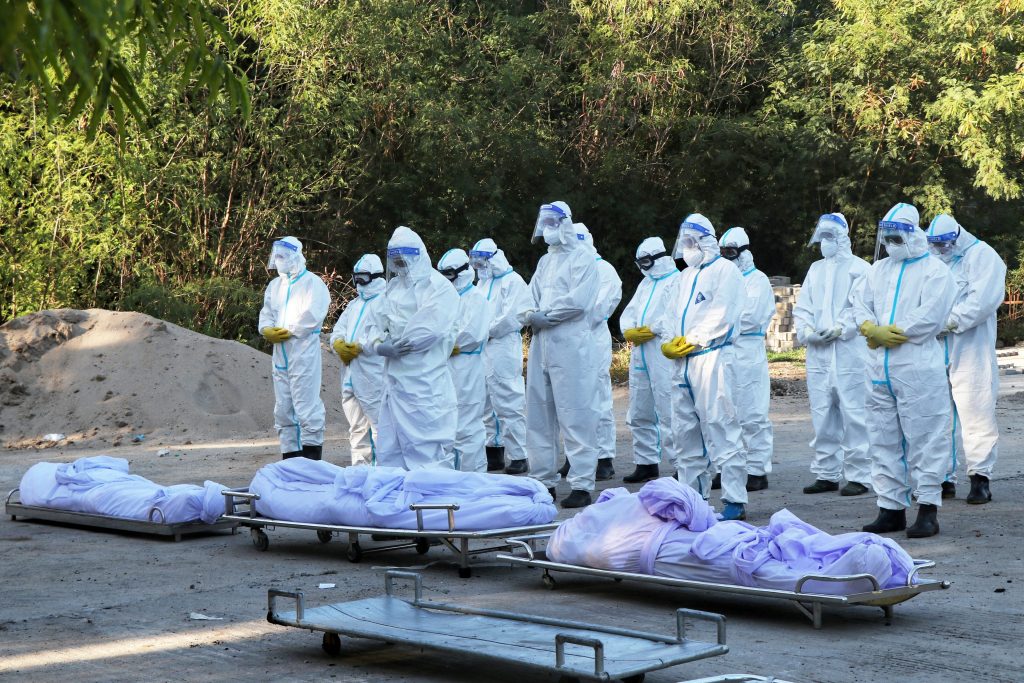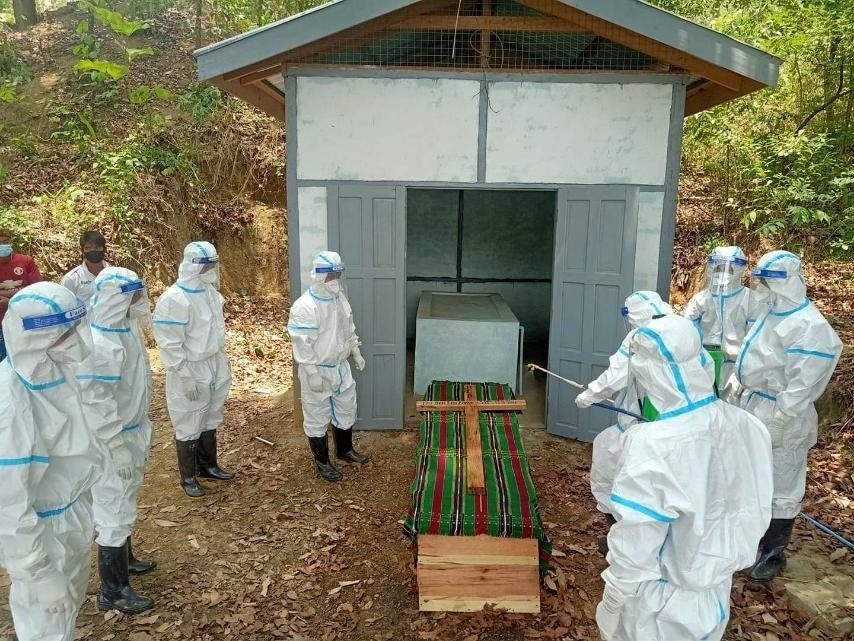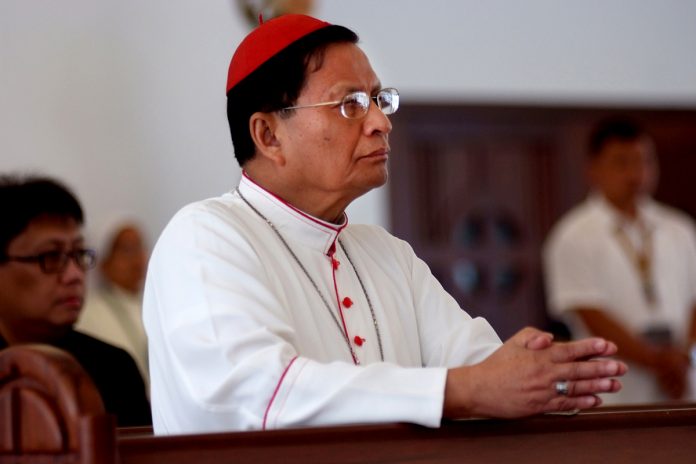Homily for the Mass for priests, religious, and the people of God who perished in the pandemic delivered on Aug. 6, 2021.
Today we have gathered here to mourn many of our most dear ones; just a few days ago, they were with us, they shared in our joys and sorrows. They were our friends, our brothers, our sisters and sons and daughters, grandmothers and grandfathers.
Today, the sadistic virus made them numbers. Today, we have come to resist that final assault of the virus on us. We refuse to accept they are just another block of number. We come to say: They are part of our life, part of our existence, part of our inalienable memory of gratefulness.
We have come here with heart-wrenching sorrow. The virus robbed us the most sacred last moments from our dear ones; many of them died alone, with the sense of abandonment. Many of them gone away without a farewell. We have shed silent tears, when they were buried alone, without the last dirge of the words too deep to express. Our sorrow has not minimized.
I think of my dearest Bishop John Hsane Hgyi of Pathein. A kind hearted shepherd, an erudite man, an ever-smiling pastor, suddenly was taken away. It was a shattering experience. I wished with all my heart to personally bid him farewell. Security considerations prevented that. I hear the news about priests dying, their anointed hands untouched in those lost moments, hear of the death of religious, their mission robbed of in the middle of life, hundreds of laity known to us gone away, leaving a hole in the hearts of the dear ones.
The virus has put us in a rollercoaster guilt. How did we allow those who lived with us for decades to go without a farewell? How did we allow ourselves to let them go without a human touch? What were their thoughts as their shattered sensibilities looked for us and their eyelids closed for the last time? These thoughts shatter us too. Because we loved them and they loved us, we grieve.
We are gathered here not only for those who have gone away. We have gathered here to heal ourselves, redeem our humanity. We have gathered here to affirm, despite the cruelty of the virus, we still hold our dear departed in our hearts. We have gathered around this altar fortified by the strong faith that through communion of saints we are still united with them in spirit. The physical contact might be gone; emotionally, spiritually we are united more now than ever.
We were used to sing the psalm of comfort, in other funerals in the normal times, calling the fellowship of the Good Shepherd.
Even though I walk through the valley of the shadow of death,
I fear no evil, for You are with me;
Your rod and Your staff, they comfort … (Psalm : 23:4)

Yes. We seek comfort in the Lord, comfort in these dark times: As our nation walks through “the valley of death” we have come to console one another and thank for the gift of those whose memory will always linger in our hearts.
These are not only moments of sorrow; despair and despondent. This is a call to strengthen our human fellowship, our Eucharist of common tragedies, our cup that overflows with sorrows. In a way all this suffering is the Eucharist: Body and tears broken amidst immeasurable sorrow.
Those who have gone before us leave us great life lessons. The first lesson is Gratefulness. As we mourn for our dear ones, the only vaccine that can cure our sorrow is gratitude. We are grateful to each one of the those who went away. They were priests, they were religious, they are our family members.
To all them we owe a debt — a great debt of gratitude. Gratitude for their fellowship. For their love, for their accompaniment. The priests who died were blessed with grace to break the Word and break the Bread. The religious broke the bread in the streets. They brought consolation during these hard times. Our dear faithful died, facing so many challenges in this country. We weep for them, there will always be an emptiness in our hearts, in our houses. That many of them it will take ages to heal.
They have also left a grim lesson to each one of us: Life is short. It is not death that matters, it is how we live during our short life. Death is the great teacher. As reflected in the timeless poem of the great poet John Donne:
No man is an island entire of itself; every man
is a piece of the continent, a part of the main;
… any man’s death diminishes me,
because I am involved in mankind.
And therefore never send to know for whom
the bell tolls; it tolls for thee.
Yes, we feel death of every friend diminishes us. How to we maintain our humanity and grow out of these dark days? We need to cry at the loss. Since we have love, our hearts are broken. To shed tears is the ultimate sanctity of human relationships. Jesus wept at his friend Lazaro’s death.
But we cannot make death arbiter of our destiny.
Because our God is not a God of death: he is God of life. “He is not the God of the dead, but of the living, for to Him all are alive.” (Luke 20:38). How consoling! To our God All are alive. We share in the Communion of Saints; All those who gone before us belong to God. One day we will join that communion of saints. We all will join the heavenly banquet.
Till that time: We celebrate life: Today we come not to mourn and bury alone: we have come to praise and thank the Lord for the gift of each person who has gone away. Their physical absence has not taken away their great memory, their love. Their love never ended as the Song of Song comforts us :
Love is stronger than death. ( Song of Songs : 8:6)

We continue to relate to them in our depth of our hearts; in perpetual thanksgiving of their life with us. Because death and grave cannot take away a Christian’s hope. They are transition points in our journey towards destination. It is Christ who won over those dark valleys as St Paul extols:
O death, where is thy sting? O grave, where is thy victory?
But thanks be to God, which giveth us the victory
Through our Lord Jesus Christ. ( I Cor 15:545)
We are waging an asymmetrical war with the invincible virus. But like other pandemic we will overcome. All will end, despite the suffocating sorrow we feel, the roller coaster anxiety that strangles our sensibilities, we shall over come. Humanity has shown that aligning as one family of compassion, we shall overcome.
The death of dear ones, did not fragment our response, but fortified our response. See the volunteers in care centers, the great sacrifice of doctors and nurses and other health professionals, whom the Pope Francis calls as “the saints next door.” See the generosity of the business community, see the contribution of the simple people and our own Christians — we know we can defeat this virus since God has put in our hearts a fire of compassion. The only plea our dear departed once would ask each one of us, still having the luxury of breathing freely and moving around, is not to give up. Not to accept the power of death.
We journey in faith through the stormy seas. We cry out often: Lord are you not worried that we are perishing. Jesus is there. Jesus appeared to be sleeping. As our cries rise to heaven, Jesus says: Have Faith. I have won over death on the Cross. That is the faith that should strengthen us brothers and sisters. As a church we are hope-generating church. We remember all those who have gone away; their journey is over. But they have not fallen on the wayside. They have reached the bosom of the eternal father. Their eyes have stopped crying, they are no more dead people. They have passed on to a place without pain.
Let us take solace in those sobering thoughts. God has promised a new life to those who have gone away. That promise is :
God shall wipe away all tears from their eyes; and there shall be no more death, neither sorrow, nor crying, neither shall there be any more pain: for the former things are passed away.
That is the same promise to make us to continue our earthly journey, making a heaven on earth, through our appreciation of the gift of life, the gift of dear ones, the gift of everything. Living in love, with great gratitude, we shall all overcome. All come to an end. This pandemic too will come to an end. Once again thanks to the saints who have gone before us; for their faith, their witness and their love.









